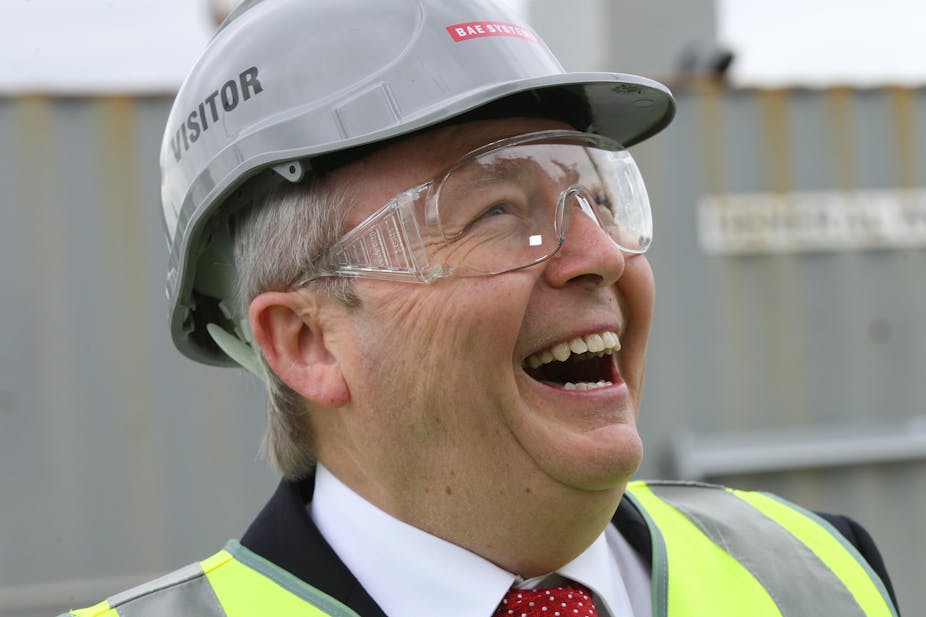In almost three weeks of campaigning both voters and Labor have had a sharp reality check: there can be no return to Kevin ‘07.
Six years on, Rudd was never going to be full of fresh promise, as he was then.
But that’s how people thought of him when in the polls they supported his return to the leadership, airbrushing out later problems. Now they see the man as he is, with the opposition pointing to large warts. And, it is clear, the man with the warts has to campaign in a very different way from his earlier self.
A well-placed Liberal describes how opinion shifted. He says that initially after Rudd’s return Liberals in marginal seats reported people were saying “Rudd’s great, we love him”. Then about seven to ten days ago, there was a change; voters started saying “we think Kevin’s a fake”. It was bizarre, he says, because the message came about the same time from all over the place and there seemed no specific trigger.
Obviously about then, Rudd’s “new way” push fizzled so he’s had to transform into Mr Negativity.
After a shocker of a start, Labor’s campaign has stabilised in this middle week, and the negative assault has put a few dents in the opposition.
But Labor’s research is finding the swing is 4.5-5% per cent against the government, which is looking at bad losses in NSW, without compensating gains in Queensland.
Meanwhile internal efforts go on to perk Rudd up, even if 07 can’t be recaptured. The advisers have worked to get him more relaxed, and doing less. The effort paid off in Wednesday’s Brisbane debate, when he put in a good performance.
With Labor’s campaign now relentlessly negative, Rudd endlessly repeats that the Coalition has a $70 billion funding problem, and will cut health and education. Abbott denies the $70 billion, and has said there will not be an overall cut in those two areas – not that the denials will stop the claims.
The Coalition’s soft underbelly this week was Abbott’s favourite policy – the paid parental leave scheme. The plan’s cost has his colleagues worried but he was always insistent on generosity.
He could, however, have limited the argument over how it will be paid for if the detail had been released with the policy. Some Liberals shake their heads at why this wasn’t done. It was either hubris (part of the “we’ll tell you costings when we’re ready” mindset) or foolishness.
Liberal sources report that self-funded retirees, part of the Coalition’s base, are alarmed by the debate over the levy on 3000 companies to part fund the scheme not attracting franking credits. Some (totally wrongly) take it as a more general threat to franking.
Shadow assistant treasurer Mathias Cormann was out yesterday talking more detail, but it was too late and still too imprecise.
The debate about the scheme (also vulnerable on fairness grounds) is taking up far too much of the attention when the Liberals want to emphasise economic management and the record of the past six years.
But most Liberals are now confident of victory, and thought is turning to government. Abbott’s announcement that he would create a trade and investment portfolio flagged that he was breaking out of the straitjacket of his earlier commitment to keep his frontbench in their present areas. This week’s wording was that “my team can expect to do more or less the same job in government”.
The trade and investment announcement signalled that deputy Liberal leader Julie Bishop would retain foreign affairs in government but lose trade, which was always going to happen. There has been speculation finance spokesman Andrew Robb could get the trade job, opening the possibility of the well-regarded Arthur Sinodinos going to finance. But the Nationals’ wishes would be a major factor here – trade is a portfolio they like to hold.
Portfolio talk is a reminder that while Abbott wants to keep mum about ministerial arrangements (not wishing to be seen getting ahead of himself), behind the scenes transition-to-power preparations are being made.
This week brought another sort of reminder – how leaders need to “sweat the small stuff”.
Especially in this age of social media, be nice to the people you mightn’t think matter. A make up woman who takes to Facebook can cause you grief. And, unless there is a very good excuse, do what you say you’ll do. Don’t over-commit. It was a bad look when Rudd pulled out of a debate in his seat of Griffith with Liberal candidate Bill Glasson, who by all accounts is running a very strong campaign there.
It looked even worse when a Guardian Lonergan poll had Rudd trailing in what is considered a safe seat. The ALP is doing its own quick check.
On the set piece calendars both parties have their launches in Brisbane, the Liberals on Sunday and Labor a week on. Labor’s choice of Brisbane reflected early optimism about that state, Rudd’s home turf. Anyway Sydney, which was the alternative, is inherently toxic for Labor.
On next week’s calendar is the third debate, which Rudd has agreed to, on the condition that the format is the same as Wednesday, both on the stage together, rather than one candidate after the other (Abbott has accepted that).
It’s generally agreed the debates won’t sway votes. But it is significant that Abbott dictated the terms and conditions for them. All three are moderated by Sky’s David Speers and Sky hosted this week’s and will do the same next week. The free-to-air commercial channels, which Rudd wanted as host stations, have been completely marginalised.
Yet it was Rudd who started his new prime ministership by demanding Abbott debate him, and tried to set the terms.
In this campaign generally, Rudd has had to respond and, rather than being able to fight on his agenda and battlegrounds.

